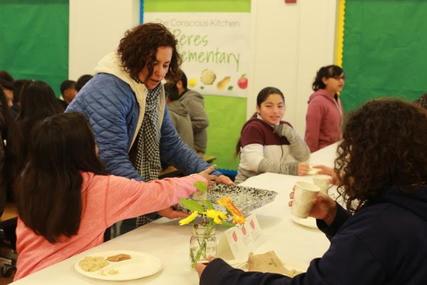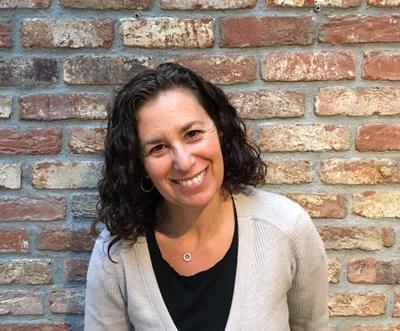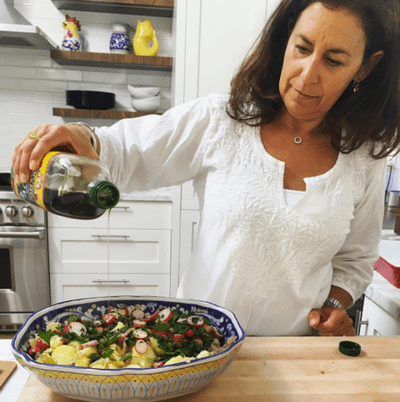The genesis of her decision to launch an integrative nutrition practice was Sobel’s own maddeningly confusing health battle that had her going down a rabbit hole in search for answers, and coming out of that quest with a passion and knowledge base that she never knew she needed.
Barbara Sobel Nutrition, for which she promises “to use real food to help people feel their best,” is the result of that journey.
That journey began with knee surgery and a post-surgery recovery that got worse before it got better. “My knee eventually healed, but I couldn’t get off the couch,” she says, noting that weight gain, hair loss and general malaise followed. Visits with physicians provided an ample array of diagnoses and conditions that she didn’t have, and prescriptions to medications that didn’t help.
Sobel later made her way to integrative practitioners, who helped her “uncover deeper and deeper layers of my health” that included that she was predisposed to certain conditions, environmental triggers in her home and needed a shift in diet.
“I learned that I had so much control over my own health and what helped me was not giving that power to a doctor or another practitioner alone,” says Sobel, who gew up in West Los Angeles, met her husband there in high school and moved to Mill Valley in the early 1990s. “It came down to doing the work and taking care of myself.”
As Sobel’s health improved, her curiosity about the impact of diet on health became insatiable. She enrolled in a Masters Program in Nutrition and Holistic Health at Maryland University of Integrative Health, learning about “chemistry and biochemistry, nutrients, vitamins and minerals, states of disease and health, and counseling.”
The two-year program had a clinical component, allowing Sobel to spend time with clients and create reports on their cases. “That experience was invaluable,” she says. “When you read a book about an issue, it’s one case at a time: thyroid, blood sugar, that kind of thing. But when you see a client, you ascertain that they have multiple things going on at once. And you have to decide, how do you get someone to change how they live their life and address these interrelated root causes of their condition?”
While she was in school, Sobel worked for Bio-botanical Research, a small herbal medicine firm in Aptos, Calif., that provided her “am amazing opportunity for me to learn outside of school from other practitioners how to work with clients,” Sobel says, noting that she attended and spoke at industry conferences.
While you don’t technically have to have a license to practice nutrition in California, Sobel garnered it anyway through the National Board of Nutrition Support Certification, allowing her to practice in other states and to be a member of the American College of Nutrition.
“That was big for me, and it also allows me to run certain tests on clients that gives me a greater sense of the underlying causes of their issues,” she says. “I look at the whole body as connective parts instead of the whole body as one point.”
For example, Sobel says skin issues can be caused by problems in the stomach, she says, because “one way our body reacts is through the skin.”
Sobel treats a wide range of clients, but her typical client is a woman who is experiencing one of the following: weight, hormone, gastro-intestinal or auto-immune issues. Over the course of several visits, Sobel seeks to determine the root cause of that issue and suggest long-term changes to address it, often introducing and removing certain foods from the client’s diet to measure the impact.
“I want people to make changes that they can do every day, day in and day out,” she says.
 As part of her work with the Sausalito-based Conscious Kitchen, Barbara Sobel serves milk to students at Peres Elementary School in the West Contra Costa County Unified School District.
As part of her work with the Sausalito-based Conscious Kitchen, Barbara Sobel serves milk to students at Peres Elementary School in the West Contra Costa County Unified School District.
Now, with nutritional expertise in hand, Sobel is working with the Sausalito-based Conscious Kitchen, which looks to partner with school districts “to shift the paradigm around food service” toward more “fresh, local, organic, seasonal, non-GMO meals.” The nonprofit organization did a one-week pilot project with the West Contra Costa School District, and Sobel did some nutritional analysis of Conscious Kitchen food versus district food. She also was in the schools all week prepping and serving food.
“Some of the kids are so excited to be part of a project where they can be involved and serving and learning and tasting,” Sobel says. “In terms of health, the quality of food is hugely improved and in terms of engagement and possible career opportunities, it was just so exciting for them.”
The 411: Barbara Sobel Nutrition is based in Mill Valley. MORE INFO.


